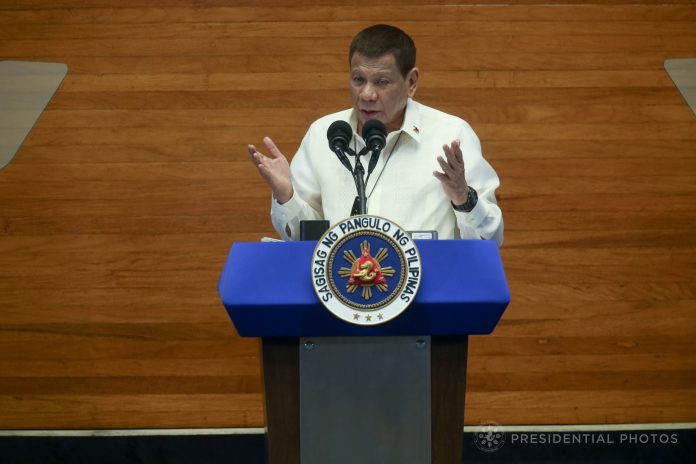As the entire world knows by now, Rodrigo Duterte always speaks his mind and often hurls expletives at those who don’t agree with him.
Pope Francis was among those Duterte pounced on even before he became president, castigating him for causing monstrous traffic during his visit here in 2015. Later, it was the turn of then US President Barack Obama to be the object of Duterte’s displeasure with another “F” word in the vernacular that the American leader casually dismissed as “colorful” language. Then there’s also his angry outbursts at various United Nations Special Rapporteurs for his bloody war on drugs and alleged human rights violations
Duterte’s pet peeves in the domestic front — drug traffickers and users, the political opposition including now detained Senator Leila de Lima, Catholic bishops, big businessmen he considers oligarchs, communists, and lately, medical frontliners in the battle against Covid-19 — have not been spared either from his all-too-frequent fulminations in the middle of incoherent and rambling speeches.
But it’s not just Duterte’s foul language that we’re concerned about. It’s the larger picture of a discernible trend since 2016 towards the other “F” word in his otherwise limited vocabulary that should give us the heebie-jeebies, or extreme nervousness.
We’re talking about the country’s gradual descent to fascism since 2016 and now exacerbated by draconian lockdowns to cope with the Covid-19 pandemic.
Fascism, or what is by other names — authoritarianism, totalitarianism, or dictatorship — is often associated with the Nazi regime of Adolf Hitler in Germany, and Benito Mussolini’s rule in Italy in the 1940s. But it did not end there, as it persisted in various forms of dictatorships in Spain, Portugal and Latin American countries in the 1970s and 1980s.
But what really is fascism?
Let’s hear what others have to say on this.
Wartime US President Franklin D. Roosevelt offered one explanation: “The liberty of a democracy is not safe if the people tolerated the growth of private power to a point where it becomes stronger than the democratic state itself. That in its essence is fascism: ownership of government by an individual, by a group, or any controlling private power.”
Henry Wallace, the 33rd US Vice President, offered another: “A fascist is one whose lust for money or power is combined with such an intensity of intolerance toward those of other races, parties, classes, religions, cultures, regions or nations as to make him ruthless in his use of deceit or violence to attain his ends …. They claim to be super-patriots, but they would destroy every liberty guaranteed by the Constitution.”
Eminent American philosopher Hannah Arendt, in her ground-breaking work “The Origins of Totalitarianism,” said: “Before mass leaders seize the power to fit reality to their lies, their propaganda is marked by its extreme contempt for facts as such, for in their opinion fact depends entirely on the power of man who can fabricate it…. Totalitarianism in power invariably replaces all first-rate talents, regardless of their sympathies, with those crackpots and fools whose lack of intelligence and creativity is still the best guarantee of their loyalty.”
More recently, Madeleine K. Albright, former US Secretary of State, proposed another way of looking at it in “Fascism: A Warning:”
“We cannot, of course, expect every leader to possess the wisdom of Lincoln or Mandela’s largeness of soul. But when we think about what questions might be most useful to ask, perhaps we should begin by discerning what our prospective leaders believe it worthwhile for us to hear.
“Do they cater to our prejudices by suggesting that we treat people outside our ethnicity, race, creed or party as unworthy of dignity and respect? Do they want us to nurture our anger toward those who we believe have done us wrong, rub raw our grievances and set our sights on revenge? Do they encourage us to have contempt for our governing institutions and the electoral process? Do they seek to destroy our faith in essential contributors to democracy, such as an independent press, and a professional judiciary?”
The answers to these questions, she said, “will tell us much that we need to know about those wanting to lead us, and much also about ourselves. For those who cherish freedom, the answers will provide grounds for reassurance, or, a warning we dare not ignore.”
What all this tells us is that we are witnessing today the very same trend toward authoritarianism in our country, with the law being weaponized to silence critics and political power concentrated in the hands of one man.
Indeed, the president’s near-total domination of the executive, legislative and judicial branches of government runs counter to the principle of checks and balances inherent in a truly democratic system, and his use of the military and the police to compel obedience to his orders highlights what Francis Fukuyama describes as “excessive state authority” that “should be constrained by the rule of law” and “needs to be held accountable … as it often leads to tyranny.”
And yes, lest we forget, foul language is now part and parcel of the fascist arsenal in the 21st century.
Ernesto M. Hilario writes on political and social justice issues for various publications in the Philippines. The views and opinions expressed in this article are those of the author and do not necessarily reflect the official editorial position of LiCAS.news.









